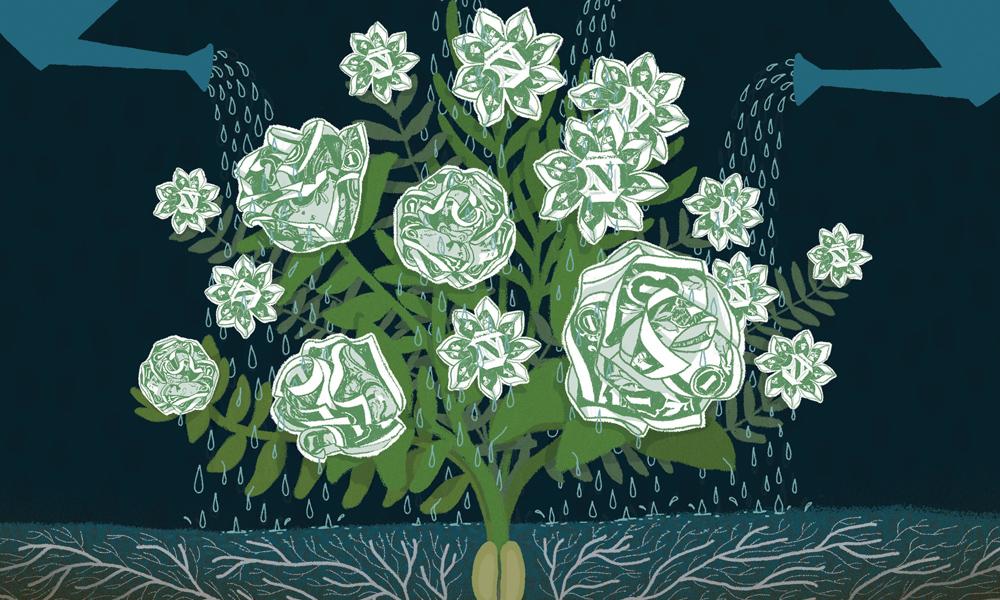Learning by giving
Education
SUMMARY: Student grant writers at JMU become philanthropists in a semester-long partnership with the Learning by Giving Foundation. The Social Work 375 course allows students to develop valuable professional skills while also recognizing the difficulties many nonprofits face in acquiring funding.
By Janet Smith (’81)
Sometimes you just have to show them the money. And sometimes a little money leads to significantly more.
Grant Writing for Agencies, a course offered by the Department of Social Work, needed a boost to make the topic more real to students. So department head Lisa McGuire, knowing that offering “real money” had worked at other universities, established a small foundation to award grants that reflected interests held by members of her family.
Family members and JMU professors came through with monetary contributions, and in 2015 and 2016 the grant writing classes had $700 per year to award to winning grant proposals. So far, so good, but McGuire wanted to increase support to benefit more nonprofit organizations.
A colleague at Indiana University informed her about the Learning by Giving Foundation, which was founded by Doris Buffett—Warren Buffett’s sister—to promote the study of philanthropy by supporting academically rigorous courses. JMU met the foundation’s standards to join the 35 Learning by Giving partner colleges nationwide and offered the first Social Work 375 course under the new affiliation.
The foundation awards partner schools $10,000 each academic year for allocation to local nonprofits.
Since that first class in Spring 2017, two other sections have been offered, all taught by Laura Hunt Trull (’01, ’15Ph.D.). A total of $37,000 has been awarded to nine local nonprofits. In addition to the $30,000 for the three years JMU has been a partner, students have garnered extra funds by winning a blog competition sponsored by the Learning by Giving Foundation. JMU students won first-place honors in Spring 2017 and Spring 2018 and the third-place award in Fall 2018.
“The course offers a very realistic experience for our students,” said Trull, explaining that the 35 to 40 students enrolled in each year’s class wear several different hats during the semester as they switch roles from grant writers to philanthropists. In addition to social work majors, the course is popular with students minoring in family studies, gerontology or nonprofit studies.
“Our students recognize that grant-writing skills are important in many settings,” McGuire said. “Securing support from granting agencies is critical for most nonprofits to achieve their missions.”
Trull solicits letters of intent from local agencies interested in consideration for funding. Then, two or three students form a team and select the agency they want to champion. Meetings with agency representatives are quickly arranged so the teams can research their nonprofits to craft their most persuasive written proposals, including financial budgets.
“It’s interesting to me to see the students have such empathy for each other and that they are often passionate about their particular areas of interest,” Trull said.
“During our class, in Spring 2018, late or incomplete grant proposals were disqualified,” said Beth Ann Eastridge (’19), who is majoring in social work with a minor in substance abuse prevention. “That was difficult, seeing plans and agencies denied money because of the rules. But, that also gave us a taste of the real world in seeking funding.”
Eastridge and senior Raleigh Hucek (’19) successfully represented the Minnick School in its quest for $5,000 in funding to create a sensory room where students can practice self-regulation strategies. The private school helps students achieve academic, behavioral and developmental goals in order to return to their home public schools or pursue meaningful work.
Senior Paige Riddle enrolled in Social Work 375 “because nonprofits rely on grants, and often people have to learn about them on the fly once they are in the field. I figured it would help my transition into the workforce to learn about it now.”
A social work major and family studies minor, Riddle and team members Hayley Jenkins (’19) and Courtney Fennell (’19) represented Gemeinschaft Home. The team was able to secure $5,000 in funding to support an outreach project aimed at area college students to recruit more volunteers for the center, which provides therapeutic services to nonviolent offenders who have been released from incarceration.
Riddle values the course’s commitment to providing a real-world experience. “I think the class would be more like a workshop without the actual funding,” Riddle said. “We would study examples of proposals and go through the process, but it would not be as real.”
She also believes the course design reinforces a critical component—relationship building—that benefited the students and the agency representatives.
“While working with our team on the research for the grant proposal itself, the administrators at Gemeinschaft Home were very interested in helping us as social work students going into the profession,” Riddle said. “There was more interest than just securing the grant.”
After graduating from JMU, Riddle hopes to work with a social services agency before enrolling in graduate school to prepare for a career in policy work. “I think my Learning by Giving experience will come in handy since so much of that specialization requires matching an agency’s vision with evaluations and outcomes, making sure they are aligned.”
Eastridge is completing a required social work internship at the Shenandoah County Social Services Department. She plans to enter graduate school to specialize in child welfare. One of the schools to which she has applied requires a writing sample. Her submission? A winning grant proposal, of course.

